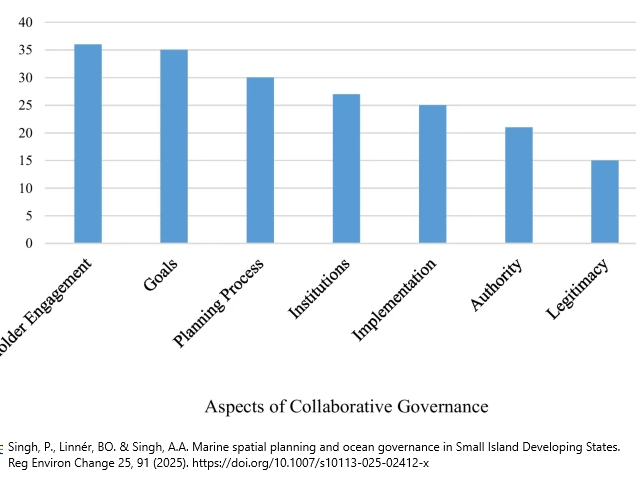
Marine spatial planning (MSP), initially developed to address the needs of the global North, is gaining significant traction in Small Island Developing States (SIDS) and is hailed as a collaborative governance instrument for managing and optimizing the allocation of ocean space. Despite its growing adoption, there has been limited attention given to what is needed for MSP to be effective and collaborative in SIDS, which is struggling with issues of fragmented ocean governance, insufficient funding, data limitations, and ad hoc stakeholder engagement. A research gap exists in identifying the conditions necessary for MSP to function effectively as a collaborative governance instrument in SIDS. By employing an analytical framework grounded in collaborative governance models, this paper reviews 40 academic articles and 15 grey literature sources to assess MSP’s application in SIDS and identify factors critical for its success as a collaborative instrument. We used NVivo software to conduct content analysis of SIDS-based academic articles. The analysis was guided by pre-defined categories within our analytical framework. The mapping and analysis of the literature point towards leadership and institutional mechanisms, which have proven essential for mobilizing MSP, integrating existing marine management strategies into MSP frameworks, and addressing local socio-cultural priorities. The literature reveals inadequate consideration for social objectives in MSP and highlights the flaws in government-led participatory initiatives. In the absence of strong leadership, inclusive governance, and sustainable institutional and financial support, MSP in SIDS risks becoming merely symbolic, addressing international commitments without delivering tangible local benefits. This study highlights the need to prioritize the process of MSP rather than solely focusing on outcomes and recommends including Indigenous knowledge and practices. A customized MSP approach for SIDS is proposed, incorporating incentives to actively engage Indigenous Peoples and local stakeholders in a collaborative ocean governance framework.














